
October marks the 34th year medical professionals at Baptist’s Heart Transplant Program have been changing lives for patients with heart failure. Since the program began, staff surgeons have performed 402 heart transplants.
The nationally renowned team, led by program director Dr. Todd Edwards, consistently achieves some of Tennessee’s best outcomes for heart transplants. Recent heart transplant data show 91.7% of Baptist’s patients are alive one year after their transplant.
As the region’s leading full-service destination for heart transplantation, the program is an especially valuable resource for patients who need care close to home.
“The best part about our facility is the convenience,” said Michelle Lorenz, administrative director for Baptist’s Heart Transplant Program at Baptist Memorial Hospital-Memphis. “It’s vital that we provide exceptional cardiac care in our community. Patients don’t have to travel outside of our region to receive the care they need.”
Heart Transplants at Baptist
The Baptist Heart Transplant Program takes on complex cases, helping patients gain back their quality of life. After a patient is referred to the program, a multidisciplinary team carefully evaluates him or her to ensure potential benefits outweigh risks.
“People with severe heart disease who no longer see results with medication may be candidates for a heart transplant,” said Alley Rutledge, postoperative nurse coordinator for the Baptist Heart Transplant Program.
Some conditions that can lead to transplant surgery include
- Advanced heart failure
- Arrhythmia
- Cardiomyopathy
- Congenital heart disease
- Coronary artery disease
- Heart valve diseases
Baptist’s transplant team assesses each patient on a case-by-case basis. Factors that help to decide if a patient is a heart transplant candidate include the severity of the heart disease, and other complicating factors that may affect the outcome of the transplanted heart.
A Dedicated Team of Experts
The program combines all cardiovascular services in one facility that includes high-quality care, research, education and data management. Transplant teams comprise dedicated medical professionals who help patients regain their health.
“The team includes experts in cardiology, cardiac surgery, pharmacy, psychology, social work and nutrition, pharmacy, physical therapy and all organ-specific physicians,” said Denise DuVall-Seaman, transplant operations manager for the Baptist Heart Transplant Program.
DuVall-Seaman, who has been with the program since 1989, said transplant patients receive life-long care the day they are referred for advanced heart-failure therapy.
“Our longest surviving patient, Mr. Thomas Bryant, received his heart 32 years ago,” said DuVall-Seaman. “He is doing well and still comes to see us for routine care. We not only help patients improve their quantity of life but also quality of life.”
While some heart transplant programs are intimidating or impersonal, at Baptist, patients receive welcoming, compassionate care.
“In some larger transplant programs, patients can feel like they’ve become a number instead of a person,” said Lorenz. “But that’s not the case here. Our patients feel like part of our family. We develop long-lasting relationships with our patients’ and their families.”
Learn more about cardiovascular care and heart transplantation at Baptist. Find a doctor by visiting our Find a Doctor page.




